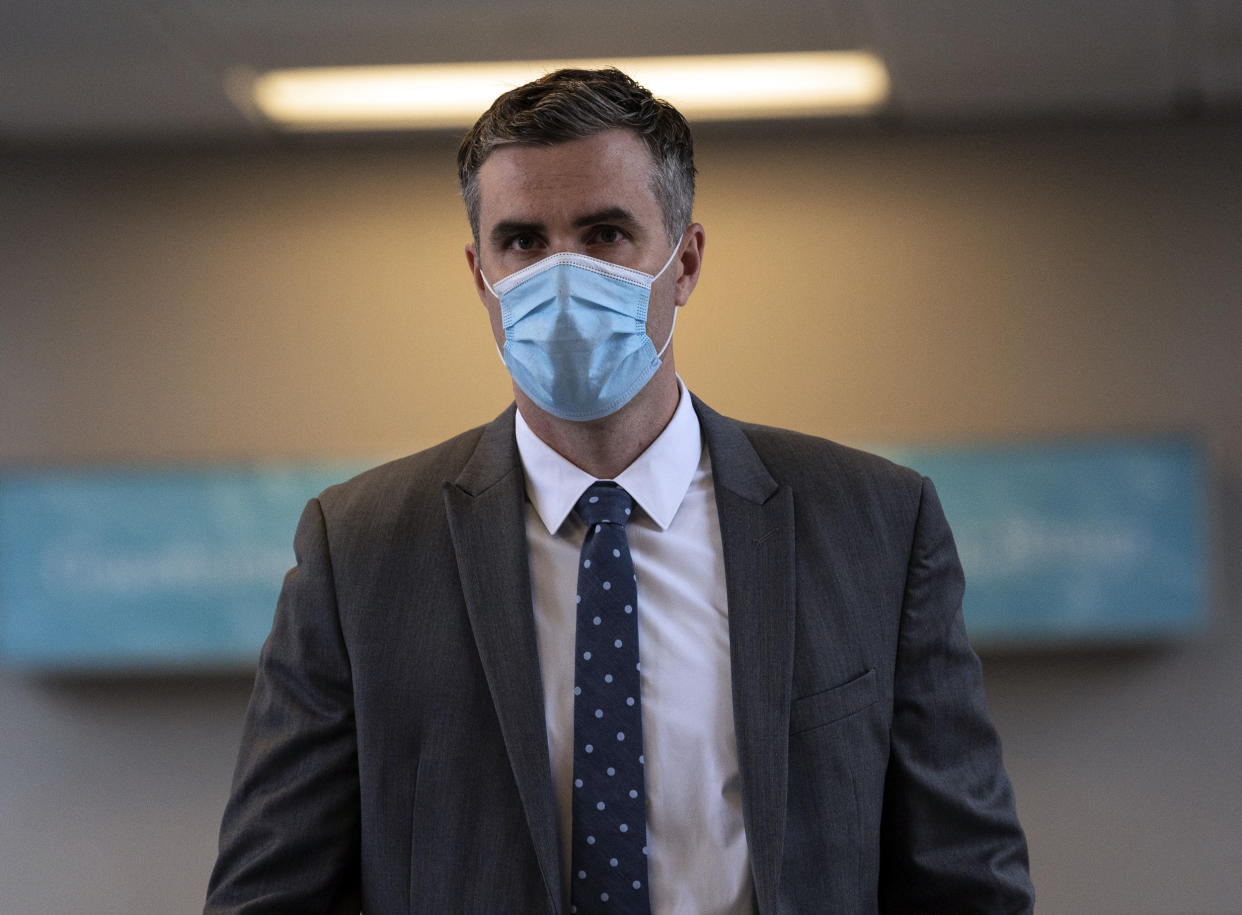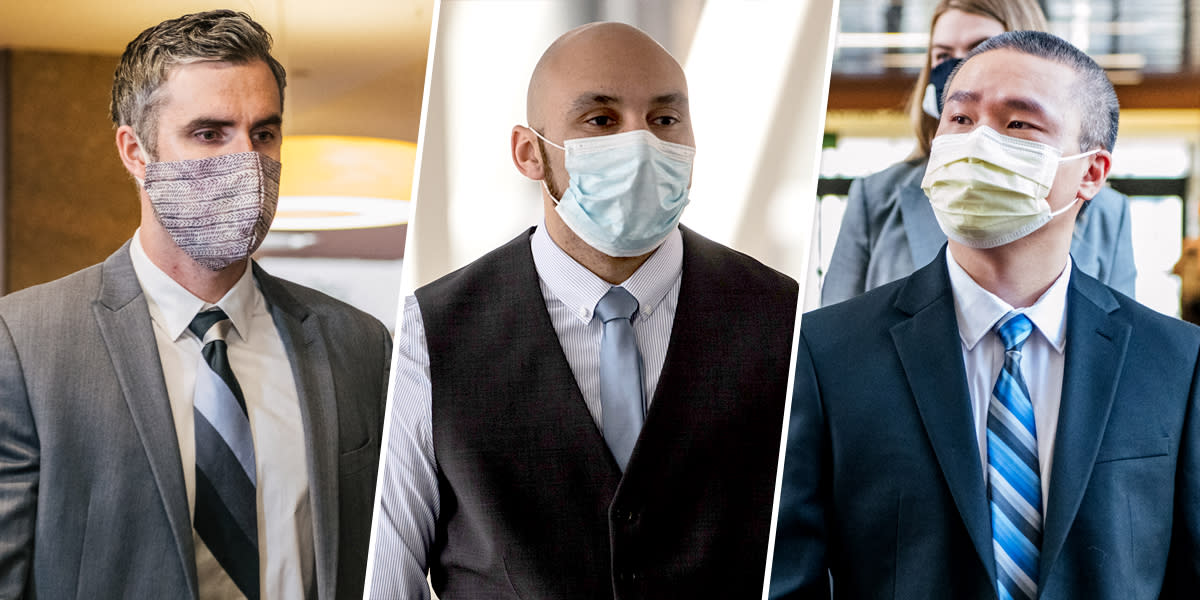'He didn't look good': Former police officer becomes tearful during trial over Floyd's killing
One of three former Minneapolis police officers charged in federal court with violating George Floyd's civil rights choked back tears Monday while testifying that he tried to assist paramedics after he was unable to locate Floyd's pulse.
Thomas Lane said he did chest compressions on Floyd when paramedics arrived and prepared to load him into an ambulance and that he offered to ride with them to the hospital.
"Why did you want to go along and help?" his attorney, Earl Gray, asked.
"Just based on how when Mr. Floyd turned over, he didn't look good," Lane, 38, said, his voice breaking as he recounted the events. "I felt with the situation, they might need a hand."
Lane was the last of three former officers to testify in their federal trial in the death of Floyd, a Black man whose police killing on May 25, 2020, spurred worldwide protests against systemic racism.
His emotional reaction was a departure from that of his co-defendants — former officers J. Alexander Kueng, 28, and Tou Thao, 36 — whose testimony over the past week was the first the public has heard from any of the men. The defense rested its case Monday, and the trial was expected to resume Tuesday with closing arguments.

Lane, Kueng and Thao are charged with violating Floyd's constitutional rights while acting under government authority as their fellow officer Derek Chauvin knelt on his neck for 9 ½ minutes.
Kueng and Thao face an additional charge of not intervening to stop Chauvin from using excessive force.
The officers had responded to a call from a convenience store in Minneapolis' Powderhorn Park neighborhood about a counterfeit bill when they encountered Floyd, 46. Lane and Kueng, both rookie officers and partners on the call, were on top of Floyd as Chauvin applied deadly pressure to Floyd's neck and he gasped for air. Thao had been in charge of crowd control.
All four officers were fired the day after Floyd's death. Lane testified Monday that he found out he had lost his job while sitting in a Subway parking lot.
"I read a news article," he said.
During his testimony, Lane said they requested paramedics after worrying that Floyd was exhibiting signs of "excited delirium," a syndrome that many medical professional associations do not recognize, although it is studied in connection with excessive force and police-involved deaths.
Lane said he attempted to de-escalate the situation when they tried to place Floyd into the back of a squad car but that Floyd began to smash his face on the back partition. Then, they moved him to the ground.
Lane said he twice asked whether Floyd should be rolled onto his side but was rebuffed by Chauvin. He added that people in the crowd began yelling, "He's not breathing."
After Kueng said he couldn't find a pulse, Lane testified that he checked Floyd's ankle for one, as well, but was unsuccessful. Paramedics arrived "seconds" later, he said. As they started to place Floyd onto a stretcher, Lane saw his face for the first time since they took him out of a squad car.
"He didn't look good," Lane said.
He said he tried to do CPR before paramedics took over with a mechanical device.
During cross-examination, Lane testified that he wasn't suggesting Floyd should be on his side because he was worried about asphyxia, but rather "I just wanted to be able to get a better assessment."
Federal prosecutor Samantha Trepel also emphasized that 1½ minutes had passed between when Kueng was unable to find a pulse and when the ambulance actually arrived.
"It didn't feel like that," Lane responded.
The defense began its case a week ago after nearly three weeks of testimony from use-of-force experts, police officers and witnesses.

Attorneys for the police officers have sought to put distance between them and what happened to Floyd when Chauvin was kneeling on him.
Thomas Plunkett, the attorney representing Kueng, has focused on his client's inexperience, while Gray told the jury at the trial's onset that Lane "did everything he possibly could to help" Floyd.
But federal prosecutors have argued that the pair's being fresh out of training shouldn't have hindered either officer's ability to intervene and that all three officers were duty-bound to act instead of watch as Floyd "suffered a slow and agonizing death."
If found guilty on the federal charges, Thao, Kueng and Lane could each face up to life in prison, although legal experts say such a severe punishment is unlikely. A state trial is scheduled for June against the men on charges of aiding and abetting murder and manslaughter.
Last year, a jury convicted Chauvin on state murder and manslaughter charges. He averted a subsequent federal trial by pleading guilty in December to violating Floyd’s civil rights and is awaiting sentencing.
He remains in prison on a 22 ½-year sentence for the state case, one of the longest imposed on a police officer for a killing in the line of duty.
